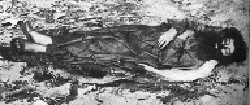Travel Reference
In-Depth Information
Figure 5.2.
Antônio Conselheiro with his head still attached to his body.
AndasdaCunhanotes,“Canudosdidnotsurrender.”Thetownwasutterlydestroyed.
Da Cunha had stated in the first paragraphs of his masterpiece that the triumph of the
civilized over the more barbarous races was an inexorable historical process. However,
he charges, “the campaign . . . was, in the integral sense of the word, a crime, and as
meaning between the beginning and the end of the topic.
. . .
Conselheiro was not the only supreme leader of the Battles of the Backlands to be sacri-
ficed to the gods. As the Canudos forces enjoyed their victory parade through the streets
of Rio amid cheering crowds with General Bittencourt and the president of the Repub-
lic, Campos Sales, waving and delighted, an assassin who had Sales in his sights leaped
with an open knife. Bittencourt threw himself in front of the president and died of his
wounds. It wasn't a
degola
, but it was a public death nonetheless.
. . .
Da Cunha returned to his father's farm, gravely ill and heartsick. Today we might de-
scribe him as having posttraumatic stress disorder. He eventually improved enough,
however, to decamp to Rio Pardo, where he repaired a bridge and wrote his masterpiece
under the patronage and intellectual support of his close friend Francisco Escobar. In a
zinc-roofed hut, he produced the topic that catapulted him into history. It seduced read-
ers by beginning with fashionable clichés, but, like the
sertanejos
, da Cunha led them
through Brazil's own heart of darkness, its mysterious geography and unknown back-
lands, to ambush them in Canudos.

Search WWH ::

Custom Search